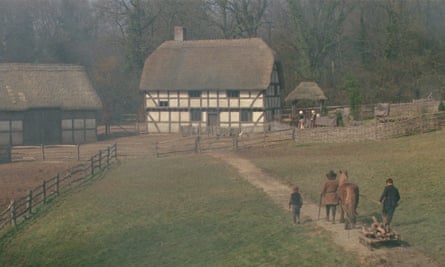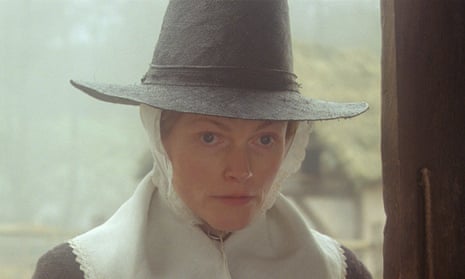Thomas Clay is a British film-making talent who has been off the radar for a while, and cinema has been the duller for it. There had been nothing since his troubling and shocking debut The Great Ecstasy of Robert Carmichael in 2005 and the Bangkok-set followup Soi Cowboy in 2008. Now Clay has returned with a stark, bleak horror-melodrama of the English Revolution: a 17th-century period piece with eerie echoes of other genres: home invasion thriller, spaghetti western, folk horror, post-apocalyptic survivalist drama. It is a tough, disturbing watch about an ecstatic awakening through violence and – with a twinge – I wondered if Clay had returned to the shock rhetoric of his debut about a rape. As it happens there is emphasis placed here on consent.
Like Peter Strickland, Clay is an authentically independent British film-maker who has come up outside the system and, like Strickland, incidentally, he has a fascination for the near-forgotten tropes and styles of 70s Brit cinema. With playful deadpan, Clay even begins with a spoof British Board of Film Censors certificate from the era, announcing that Fanny Lye Deliver’d has been passed with an “X-certificate” (I think our modern-day BBFC will in fact let it go at a 15).
This could also be an allusion to 17th-century-set films made around this time, such as Kevin Brownlow’s Winstanley (1975) or Michael Reeves’s Witchfinder General (1968), with which it has quite a bit in common – although Clay’s witchfinder is allowed a few anachronisms from 2019, such as: “I’d lose the attitude if I were you ...”
It is 1657, during Oliver Cromwell’s reign, and Maxine Peake plays Fanny Lye, a hardworking farmer’s wife somewhere in Shropshire where woodsmoke and the bleat of barnyard animals drift in the wind. She has learned to suppress her natural intelligence and inquiring mind through marriage to brutal Puritan ex-soldier John Lye, gloweringly and effectively played by Charles Dance. To impose his patriarchal discipline, Lye thinks nothing of taking the stick to their young son, Arthur (Zak Adams) or to Fanny herself.

The family is astonished one Sunday when a naked man and woman appear, bruised and dishevelled, begging for shelter and claiming to have been robbed: Thomas (Freddie Fox) and Rebecca (Tanya Reynolds). With misgivings, and mollified by Thomas’s alleged military service, Lye allows them to stay, but then there are rumours of a couple wanted by the authorities for licentious orgies and subversive “leveller” preaching – spreading the scandalous notion that a woman may be as good as a man, and that Christianity should be a doctrine of love, not guilt. And so Thomas and Rebecca begin their revolutionary campaign of sensuality in the Lye household, starting with a glimmer of recognition in Fanny. But is the charismatic Thomas as purely dedicated to love as he claims?
Fanny Lye Deliver’d is a film interestingly inspired, like so much art and popular culture about the period, by the great historian Christopher Hill and his mould-breaking 1972 book about radical ideas, The World Turned Upside Down. Clay’s script teasingly alludes to that title. Using the fascinating, subversive “underground” writings of the era, Hill taught us all to think of that time as a hotbed of blazing radicalism. Of course, it may be that the influence and reach of these texts has been exaggerated, to say the least – like historians 300 years in the future believing that in 1969 everyone was on LSD. But it is powerful to think of ideas as a kind of narcotic drug and sensual escape in this grim historical period. Ben Wheatley’s English Revolution film A Field in England (2013) had similar ideas – and Clay introduces “shrooms” into the parodic communion scene.
It is an arresting film, although a bit programmatic, with narrative turns that can broadly be predicted. Yet the lead performance by Peake holds it together: fierce, strong, intelligent – a convincing depiction of someone who will learn from what she will survive.

Comments (…)
Sign in or create your Guardian account to join the discussion